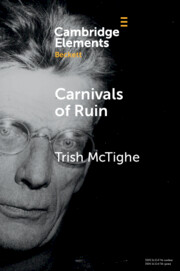Element contents
Carnivals of Ruin
Published online by Cambridge University Press: 09 January 2023
Summary
Keywords
- Type
- Element
- Information
- Series: Elements in Beckett StudiesOnline ISBN: 9781108963947Publisher: Cambridge University PressPrint publication: 26 January 2023
References
- 5
- Cited by



